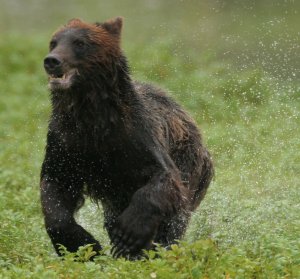|
While browsing, Tanya
smells something.
|
A moment of perfect panic.
Note the hair standing up.
|
|
Exploring, panic subsiding.
|
A familiar scent after all.
|
Bears differ from us in a lot of ways, but I personally think the single biggest difference is their extraordinary sense of smell, which cannot meaningfully be compared to our paltry olfactory equipment.
One day years ago, as I paddled my kayak along a shore in British Columbia, I saw a bear foraging for food. When I first saw him he was crosswind to me, and quite far off, so he didn't sense me. I planted my kayak on a sandbar so I could relax and watch the bear.
As I watched him move away, I realized he would eventually get downwind from me, and I was curious whether he could smell me from that distance. Finally he was directly downwind and a good half mile away. At that point he gave a jump, sniffed the air several times in some anxiety, and bolted for the brush.
Later I told this story to a girlfriend, who smilingly replied, "So, Paul, on that day, how long had it been since you took a shower?"
Since then I have met hundreds of bears in various circumstances, and nearly all of them sensed me with their noses at some point, and it is perfectly obvious how important and central this sense is to a bear. Sometimes a bear will see me and try to smell me, but cannot because of contrary winds, which is a reason to be cautious — a bear that cannot smell you is dealing with an unknown quantity and is more anxious than he would otherwise be. It's much better to arrange to approach a bear from upwind, assuming you are not a hunter, who wants to do the opposite.
|
Old female checking me out
|
An intense olfactory experience
|
Smell is so important to a bear that I wish I had some different word to describe what a bear is doing with his nose, because it is certainly not what we do with ours. One way to suggest the difference is to say that we lead with our eyes, and follow up with our noses. For a bear, it's the reverse — he will lead with his nose, and follow up with his eyes. And it may turn out this is not because of bears' supposed poor eyesight (bears have eyes about as good as ours, but tend to be more nearsighted), but simply because their noses are a more reliable and sensitive way to sort out their environment.
When I am in Alaska I am sometimes asked why I don't fish from my boat, as nearly everyone does there. The explanation is almost rudely long for casual conversation, but basically I can't fish from my boat and expect to get away with what I do in bear country. After smelling something edible from a distance, bears have been known to swim out to unoccupied boats and tear them to pieces. I've watched bears begin to swim out to my boat in simple curiosity, and I've had to wave my arms and yell to dissuade them. At times like that I try to imagine what would happen if my boat smelled like fish.
To address the reverse situation, I have also smelled bears, and they are the rankest smelling creatures in nature. Once you smell a bear, there is no confusing it with any other natural smell (imagine the essence of old gym socks patiently distilled into a separate, intense life form) and anyone who can be surprised downwind from a bear needs to blow his nose and try again. I have seen bears take a long swim, get out of the water, and smell even worse than beforehand. I am amazed that a bear can smell anything besides himself, but it seems nature has ways to make that possible.


 Share This Page
Share This Page

 Share This Page
Share This Page


 Share This Page
Share This Page